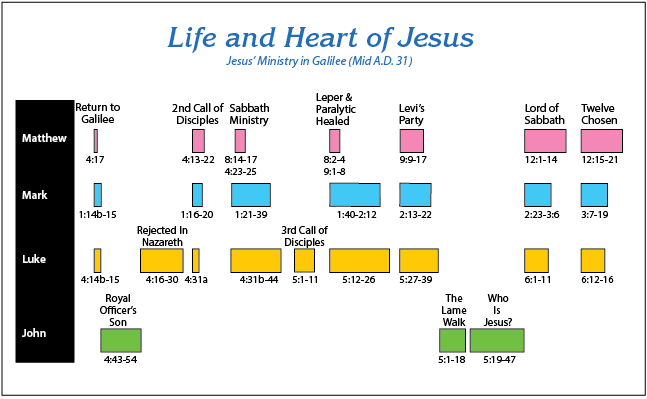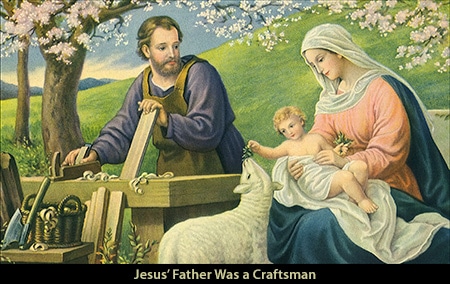You might have heard or been taught that Jesus called twelve men to become His disciples early in His ministry. But if we read scripture carefully, we discover that He had called a small group of them three times before He finally selected the twelve. The first time He called anyone was recorded in John 1:35-42. In that passage we are told that Jesus was walking near John the Baptist and several of his disciples. When John saw Jesus, he responded by calling attention to Him as he said, “Behold, the Lamb of God!” In response, two of John’s disciples, John and Andrew, began following Jesus. Jesus turned around, stared at them and asked, “What do you seek?” John and Andrew responded by asking to spend time with Him. After a while they believed in Jesus. The Holy Spirit tells us that they believed that He was their Messiah. Peter believed too! The first step in the life of any follower of Jesus is to respond by believing. That is the first call.

Test of Belief
If you belong to Jesus, if you had a beginning with Jesus, if you are born again, then you started by believing in Jesus just as these men did. Once you believe, Jesus will test you and call you to follow Him! Any true follower of Jesus Christ will follow and these men did.
After these men believed, they followed Jesus from the Jordan River over to Cana in Galilee, where Jesus turned water into wine (John 2:1-12). Then they followed Him down to Jerusalem for the cleansing of the temple, the Passover Feast, and there they watched Him perform signs (John 2:13-25). Next, they followed Him back up to Samaria where Jesus met the woman by the well, and then they left Him when they entered Galilee. This small group of men – Peter, Andrew, John, and maybe James – left Him and went home to Capernaum. Why did they leave Him? We do not know. We are not given any reasons. We just know they did.

Second Call
While this group of men went to Capernaum, Jesus went to Cana where He honored a court official’s request that He heal his son. THen Jesus left for Nazareth, and there His hometown friends and the elders of the synagogue rejected him. It must have been a discouraging time, but it did not change Jesus’ plans.
The next chronological event occurred in Matthew 4:18-22 and Mark 1:16-20 where we are told that Jesus called Peter, Andrew, James, and John. Both gospels start by telling us that Jesus was walking by Himself. There were no crowds. Peter and Andrew were casting nets in the water, and James and John were repairing their nets. When Jesus approached Peter and Andrew, He simply commanded them to “Follow me, and I will make you fishers of men,” and they did once again! But it did not last.
If these men wanted to catch men, they had to follow Jesus. That was Jesus’ message. There was a prerequisite for catching men. There was and still is a condition attached to effectively making disciples for Jesus. We must start by following Him! We cannot effectively catch men if we are not following Jesus.
Why did they leave Jesus the first time? It would be wonderful to know. Why did Jesus come after them? While we do not know the answer to that question either, one thing is clear – they were not following Him and so Jesus came after them! And they followed Him into Capernaum and spent a day with Jesus. From there Jesus traveled throughout Israel and the people flocked to Him from the Decapolis, Jerusalem, Syria, and from beyond the Jordan.
The first call was to believe in Jesus. The second call was to follow. But only Peter, Andrew and John appear to have been present at each call. Yet, it is possible that James was present during the call to believe, but perhaps was not mentioned.
Third Call
When we come to our passage for this study, Luke 5:1-11, we find Jesus standing on the shore of the Sea of Galilee surrounded by a crowd of people.
Now it happened that while the crowd was pressing around Him and listening to the word of God, He was standing by the lake of Gennesaret . . . Luke 5:1 (NASB)
This is the third call. Some believe that Luke 5:1-11 is not a third call but just another eye witness recording of what happened during the second call. But we will see shortly that the events that occurred during the second and third calls are significantly different. The question that we will answer at the end of this study will be: why was there a third call?
Only Luke calls the Sea of Galilee a lake – Lake of Gennesaret. Technically, Luke is correct. It is a lake – not a sea – since the body of water is not connected to the ocean.
. . . and He saw two boats lying at the edge of the lake; but the fishermen had gotten out of them and were washing their nets. Luke 5:2 (NASB)
Jesus saw two empty boats at the edge of the water when He arrived. The fishermen were on the shore washing their nets. This is different from the second call where Peter and Andrew were casting nets into the water, and James and John were repairing their nets. But here they are washing their nets. The Greek word for “washing” actually has the idea of “cleaning.” Both were true; they were cleaning the nets by washing them. Maybe they were pulling dead plants and debris out of the nets as they washed them.

Then Jesus got into Simon Peter’s boat and asked him to move the boat away from the land so that He could teach the crowd and use the boat as a pulpit.
“And He got into one of the boats, which was Simon’s, and asked him to put out a little way from the land. And He sat down and began teaching the people from the boat.” Luke 5:3 (NASB)
When Jesus finished teaching, He commanded Peter to move the boat out into deep water and then start fishing.
When He had finished speaking, He said to Simon, “Put out into the deep water and let down your nets for a catch.” Luke 5:4 (NASB)
Peter Objects
But Peter objected to Jesus’ request.
Simon answered and said, “Master, we worked hard all night and caught nothing, but I will do as You say and let down the nets.” Luke 5:5 (NASB)
Peter explained that he had been fishing all night and had caught absolutely nothing at all. The gospels tell us that Jesus’ supposed human father was a carpenter (Mark 6:3). But the Greek word was used to refer to craftsmen such as carpenters, masons, or metallurgists. So, we do not know if Jesus’ father was a carpenter, but we do know that he was craftsman. It is most likely that Jesus had learned this trade from His mother Mary’s husband Joseph. But Peter was a fisherman, and Jesus was not. Peter was a professional fisherman. Peter earned his living by fishing, and he was very good at it.
So when Jesus commanded him to drop the nets and fish in the deep part of the water, Peter could not believe it. Jesus was not a fisherman and Peter was. Peter must have thought that Jesus just did not understand fishing. For Peter this was the amateur versus the professional, or the student versus the teacher.
But notice that Peter responded with “Master . . .” Peter recognized that Jesus was above him in some way. We do not find these words in the first or the second call. Therefore, it is clear that Peter has had an attitude change toward Jesus since the second call. Peter followed Jesus’ instructions even though he thought Jesus was asking him to do a stupid thing.

Peter’s Surprise
Peter obediently submitted and did as Jesus had asked.
When they had done this, they enclosed a great quantity of fish, and their nets began to break; so they signaled to their partners in the other boat for them to come and help them. And they came and filled both of the boats, so that they began to sink. Luke 5:6-7 (NASB)
Peter and the other men were stunned by what happened. They were afraid. Peter called for help, and James and John (see verse 10) came over in their boat to help. Peter found that there were not just a few fish left in the lake that day. There was a huge quantity of fish. The nets were breaking and the boats were filling and sinking due to the great number of fish! This was a fisherman’s dream catch. Talk about catching the largest fish, Peter had just made the biggest catch of his career.
How would you feel if you were Peter? This should not have happened, according to Peter. He had been fishing all night. He knew how to fish. He was not an amateur. How did he feel? How would you have felt?
But when Simon Peter saw that, he fell down at Jesus’ feet, saying, “Go away from me Lord, for I am a sinful man, O Lord!” Luke 5:8 (NASB)
What had just occurred was a miracle and Peter knew it. Peter knew that there were no tricks or gimmicks. Jesus did real miracles and not fake ones. How did Peter respond? His words are a surprise,
Go away from me Lord, for I am a sinful man, O Lord!
Go away! Go away from me, Lord, for I am a sinful man! These are not the words of a happy man who just made the biggest catch in his professional career. Peter had never said this before when Jesus preached, taught, or did miracles. But this time Jesus had performed a miracle that Peter really understood. It occurred within Peter’s professional expertise, on his turf, and he was stunned and afraid.
Go away from me Lord, for I am a sinful man, O Lord!
The Jews knew only a righteous man could perform such a miracle (John 9;15-16), and Peter knew he was a sinner. Peter now understood that Jesus was not just his Master. Peter now understood that he was a sinner and Jesus was not. Peter understood that Jesus was the professional and he, Peter, was the amateur. Peter understood that he was the student and Jesus was the teacher. Peter understood that Jesus was way above him. He was Lord!
Have you ever asked God to do something for you and kept the request to yourself so that if it occurred you would know that it came directly from God? I have done that. Many years ago I was struggling in my relationship with God, and I kept asking God to help me know if I was a Christian and to help me know if I was doing what He wanted. I asked for an unusual sign. My wife and I were traveling down through central California, and we decided to take a two-hour detour and have lunch at a favorite restaurant in Cambria, California. When we arrived, we were seated near a group of people. We had a brief discussion. Sometime later they left. When my wife and I finished lunch, we asked for the bill and we were told that we owed nothing. The waitress explained that the group of people next to us had paid our bill. That had never occurred before, and it has never occurred since. I knew that God was speaking to me. Peter knew that too!
Catching Men
The next part of the passage tells us that James and John were amazed too!
For amazement had seized him and all his companions because of the catch of fish which they had taken; and so also were James and John, sons of Zebedee, who were partners with Simon. And Jesus said to Simon, “Do not fear, from now on you will be catching men.” Luke 5:9-1 (NASB)
They were all amazed, and they were afraid of Jesus. Why were they afraid? They now understood that Jesus was not like them. Jesus was beyond them! Jesus had real authority!
So Jesus comforts them, “Do not be afraid . . .” But He did not stop there. He added, ” . . . from now on you will be catching men.” Jesus did not say that at the second calling. The miracle of the catch of fish did not occur at the second calling, and the men were not afraid at the second calling.
At the second calling Jesus had commanded,
Follow Me, and I will make you become fishers of men. Mark 1:17 (NASB)
Jesus’ message was simple. If we want to serve Him, we must start with Him. Sometimes we think that to follow Him means that we serve Him. But notice that Jesus said that we are to follow first, and then we can serve Him. The Greek word for “follow” actually means to follow behind. Jesus was calling Peter, Andrew, James, and John to physically walk with Him, go where He went, and do what He did. They would need to commit themselves to be with Him, before they would be effective in ministry. Their daily routine would become Jesus’ daily routine. Jesus had called them to abandon their own wishes, but they had not done that. They had left Him several times, and each time He came after them.
But now Jesus tells Peter,
. . . from now on you will be catching men. Luke 5:10 (NASB)
Something had changed since the second calling. At the second calling, Jesus had indicated that if Peter wanted to be a fisher of men, he would have to follow Him. There was a condition to catching men. They had to follow Him, but here Jesus now says that Peter will be catching men. Something has happened.
The Difference
What has happened to Peter? The answer is that Peter had finally understood that Jesus was the MASTER. Peter was not the potter. He was only the clay. Peter was nothing compared to Jesus. Jesus was his Lord!
Earlier, when Jesus had asked Peter to cast the nets into deep water, Peter had objected. But after the miracle, there is no objection. After the miracle, there was a change of heart. After the miracle, we are told that Peter and the other men left everything. They did not do that at the second call.
When they had brought their boats to land, they left everything and followed Him. Luke 5:11 (NASB)
Scripture teaches us that there are different levels of commitment. On one occasion in Matthew 20:24-26, Jesus had told the disciples that if they wanted to be great in the kingdom of God, they needed to be servants. But if they wanted to be first in the kingdom, they would need to be slaves. Jesus said we had two choices, to be a servant or to be a slave. Paul, the apostle, called himself a bondservant. There are different levels of commitment.
At the first call, these men believed. That was step one. At the second call, Jesus commanded Peter to follow and he did. That was the next step. But here Peter finally submitted himself completely. He withheld nothing and left a fisherman’s dream catch of fish. He left the boats. He left everything to follow Jesus!
Conclusion
I believed in Jesus when I was a junior or senior in high school. It was wonderful after that, and the Lord started tugging on my heart to serve Him. Sometime in my twenties I finally told the Lord that I would follow Him and do whatever He wanted me to do. God had called me to believe and to follow Him, but late in my thirties God put me in a hospital for ten days. I was in a serious condition, and when I got out of the hospital I visited two doctors. Each one told me that I should be dead. One doctor said, “You know that you should not be here, don’t you?” Today, I am living on borrowed time. God had sent me a message that I understood. God had called me to believe. Yes, He had called me to follow Him, and then He called me to give Him everything.

Is God calling you to leave everything too? He does not call us to be like Peter. When He calls, He calls us to sacrificially serve Him, He is not looking for us to comment as Peter did,
Master, we worked hard all night and caught nothing, but I will do as You say and let down the nets.
He is not looking for questions, objections, rationalizations, or anything else. He just wants us to trust Him. He wants us to leave everything and follow.
The following poem titled “Christ Alone” by Theodore Monod captures what happened to Peter,
Oh, the bitter shame and sorrow
That a time could ever be
When I let the Savior’s Compassion
Plead for me in vain; and I proudly answered,
“All of myself, and none of Thee.”
Yet, He found me I beheld Him
Bleeding on the tree;
I heard Him pray, “Forgive them, Father.”
And my willful heart said, faintly,
Some of myself, and some of Thee.
Day by day, His tender mercy,
Healing, helping, full and free;
Brought me lower, and lower, while I whispered,
“None of self, and all of Thee.”
Jesus is not looking for you to believe. He is not looking for you to follow Him. Jesus just wants everything. He wants all of you . . .
Sign-up to be notified about future studies?